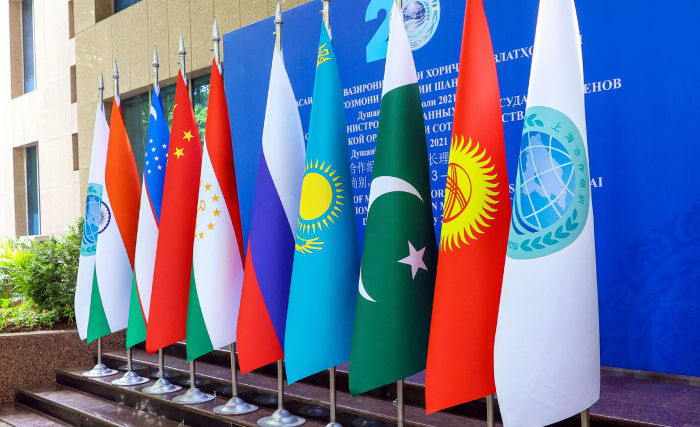The stability of Kazakhstan’s foreign policy is proof that a strategic approach to international relations works.

Photo credit e-cis.info.jpg
The Shanghai Cooperation Organization (SCO) is a pertinent regional organization across the Eurasian Chessboard. Reinforcing strength and connectivity among the regional actors, the SCO stands high on the model of Liberal institutionalism. This theoretical framework provided by International Relations discourse guarantees the possibility of cooperation and development among the rationalistic actors through the platforms provided by International institutes.

Zaman Bajwa.
This hypothesis was validated to be true as the SCO charter rescinded hierarchical order within this organization as this organization provides a chair of the presidency to each permanent member state of this organization for a year. Therefore, Central Asian Republics especially Kazakhstan fully utilize this regional forum to serve the interest of their people even in the presence of two major powers China and Russia within this organization. This liberal approach adopted by the SCO has paved the way to look at the conflicts democratically, which is helpful for gaining consensus between the member states.
Indeed, the SCO plays a crucial role in fostering economic integration and infrastructure development among its member states. For Kazakhstan, which is strategically located at the intersection of Europe and Asia, the SCO provides a valuable platform to strengthen trade, investment, and transportation ties with its neighbors. Kazakhstan’s active participation in the SCO exemplifies its strategic approach to regional collaboration and development.
Kazakhstan has played a key role in establishing the SCO’s agenda and priorities, particularly in economic cooperation, security, and connectivity. Kazakhstan’s leadership in the SCO is distinguished by a strategic awareness of the organization’s diversified interests, as well as a dedication to promoting a stable and cooperative geopolitical climate. This is obvious in its efforts to convert the SCO into a more practical and productive platform that encourages member states to cooperate more in trade and security. Kazakhstan’s active involvement in projects such as the SCO Business Council and the SCO Development Bank demonstrates its dedication to the organization’s goals. These efforts have provided opportunities for member countries to interact on economic issues and work towards common regional development and prosperity objectives.
Kazakhstan has also demonstrated a commitment to tackling environmental issues and increasing digital connection within the SCO framework. This comprehensive balancing strategy is consistent with its vision of a sustainable future and efforts to avoid a geopolitical division between East and West. Kazakhstan’s role as SCO chair has also allowed it to push crucial projects, such as the 2025-2027 Program of Cooperation on Countering Terrorism, Separatism, and Extremism.
However, the lack of large economic projects and finance support systems continues to pose a hindrance to the SCO’s development. To overcome this impediment, Kazakhstan has proposed leveraging the Astana International Financial Centre as a platform for increasing financial and portfolio investments in SCO-funded regional initiatives. This unique method has the potential to open up new avenues for economic cooperation and development in the SCO region.
The stability of Kazakhstan’s foreign policy is proof that a strategic approach to international relations works. Characteristically predictable, balanced, and peaceful, the country’s foreign policy has been central to its role as an active influencer in organizations such as the SCO. This approach is Kazakhstan’s promise to promote local cohesion is consistent with stability.
Therefore, Kazakhstan is expected to continue to adhere to these principles in foreign policy. This stability not only boosts Kazakhstan’s international credibility but also contributes to regional stability and continued development. SCO is not only about what Kazakhstan is making out of it, for their national interest but also for the region. At the first meeting of the SCO National Coordination Council in Almaty in August 2023, Murat Mukushev, SCO Country Coordinator in Kazakhstan, stressed that Kazakh leadership will focus on addressing regional and global issues, role enhancing organizational growth.
At a meeting of the Council of Heads of State in July 2023, President of Kazakhstan Kassym-Jomart Tokayev outlined Kazakhstan’s SCO presidency goals. Focused on combating transnational crime, drug trafficking, and cybercrime, with plans to update the cooperation framework against terrorism, separatism, and extremism from 2025-2027 Kazakhstan also uses SCO Anti-Narcotics Strategy for 2024-2029 proposed to sustain long-term. He also highlighted the Afghan crisis as a bog in the backyard of Eurasia, a major concern, and the plan for the UN Regional Center for Sustainable Development Goals.
Known for its nuclear non-proliferation, conflict resolution, and energy transition efforts, Kazakhstan is proposed to focus on peace, security, and sustainable development in the SCO presidency. This role is to address not only Kazakhstan’s challenges but also the Central Asia strategic issues. Its role as an emerging leader in SCO is raising the voice of people of Central Asia as well as the whole of Eurasia to the West. Kazakhstan has offered proposals to enhance cultural and humanitarian cooperation among SCO countries.
These proposals include initiatives such as the implementation of the Spiritual Shrines of the SCO project, and organizing the SCO International Science and Practice Seminar on The Golden Horde and its Legacy, in Turkistan. Their goal was to combat climate change. During its Chairmanship, Kazakhstan is looking forward to the adoption of important intergovernmental agreements on environmental protection cooperation, a cooperative program for the development of specially protected natural areas and ecotourism, and a Memorandum of Understanding between the SCO Secretariat and UNEP.
Kazakhstan’s strategic location in the heart of the Eurasian continent undoubtedly enhances its role as chair of the SCO. This important role is expected to contribute to the stability of Central Asia and the region’s unity has improved. The central location of the country offers a unique advantage in mediating local issues and enforcing cooperation among SCO member states. This can lead to a stronger and more prosperous Central Asia. Kazakhstan’s presidency in the SCO is therefore not only a testament to its growing influence but also an important step toward regional stability and integration.
Previous SCO summits have had an impact on geopolitical strategies, limiting the potential for progress. It can therefore be difficult to reach a fair agreement on urgent safety issues such as water security. However, if successful, Kazakhstan could focus on special economic policy agreements, perhaps increasing regional stability and increasing economic integration. Therefore, Kazakhstan’s leadership of SCO is expanding the horizons of its agenda.
The author is Zaman Bajwa, the Executive Director of Islamabad Think Tank YFK.
The article was originally published in The Nation, the daily newspaper based in Lahore, Pakistan.
